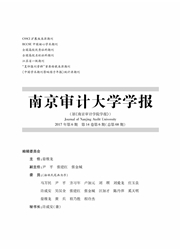

 中文摘要:
中文摘要:
公允价值计量具有价值相关性,但也存在资产估价的风险性,这一会计估计风险对以风险成本为基础的审计定价及其变化至关重要。以后金融危机时期2009--2012年沪深上市公司的数据为样本,实证研究公允价值计量下的资产价值变动对审计收费的影响,结果显示:持有资产价值变动总体和公允价值变动损益、资产减值损失分项均显著正向影响审计收费,这表明持有资产价值变动幅度越大,审计收费越高;在持有资产价值变动总体正向影响审计收费的强度逐年显著增强的情况下,公允价值变动损益对审计收费正向影响的显著性提升,但是影响强度下降;资产减值损失对审计收费正向影响的强度和显著性均逐年提升,这表明审计收费蕴含公允价值估计风险和资产计价的公允性。
 英文摘要:
英文摘要:
Fair value has value relevance but the risk of asset valuations does exist, so this estimated accounting risk is essen- tial to the cost risk based on audit pricing. This paper uses data of listed companies in China from 2009 to 2012 to empirically test the effects of fair value and asset impairment on audit fees. The result shows that : gains or losses from changes in fair val- ue and asset impairment loss both have a significantly positive impact on audit fees. It indicates that the greater fluctuation of the holding assets' value is, the higher audit fee company will undertake. In the meantime, with the increasingly positive influ- ence of asset value fluctuation on audit fees year by year, the significance of the positive impact of gains or losses from changes in fair value on audit fees is rising. But with the decrease of the strength of this influence, both the significance and strength of the positive impact of asset impairment on audit fees are increasing. The results indicate that the audit fee contains the fair- ness of estimated audit's risk cost and pricing basis.
 同期刊论文项目
同期刊论文项目
 同项目期刊论文
同项目期刊论文
 期刊信息
期刊信息
